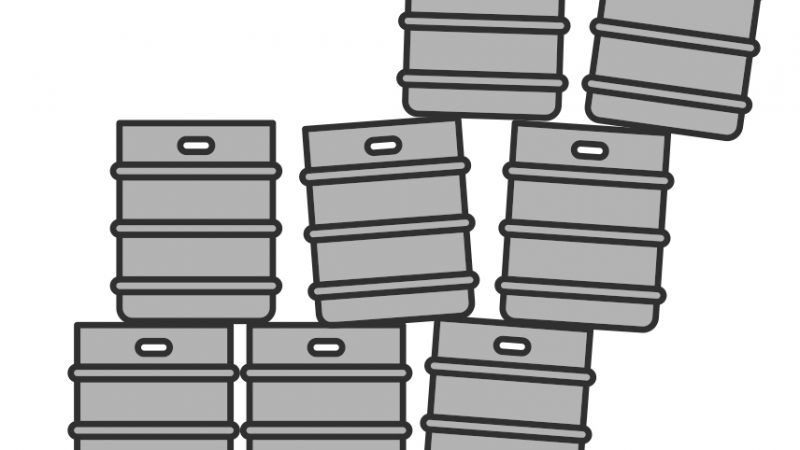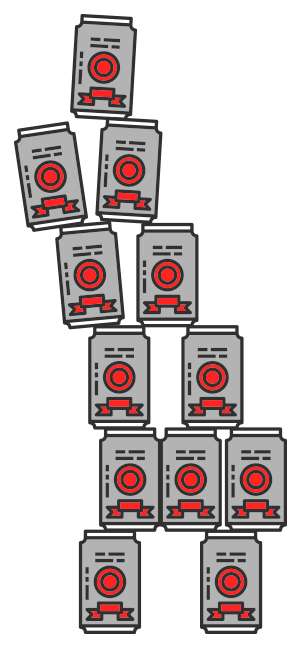Protectionism vs. Cheap Beer
If you tax something, you get less of it, and Trump's tariffs are a tax on making things-including cans, kegs, and the beer that goes into them.


Located on the outskirts of Philadelphia, American Keg is the type of small, blue-collar manufacturing business that might earn praise from President Donald Trump. It's the only remaining American manufacturer of stainless steel beer kegs, and CEO Paul Czachor is proud to use only American-made steel.
But American Keg is in jeopardy of going out of business, and the culprit is none other than Trump himself. The president's 25 percent tariff on steel and 10 percent tariff on aluminum apply only to imported metal, but they will increase the price of domestic products too, because, well, that's what tariffs do.
Although they've been blunted by the White House's decision to exempt imports from Canada, Mexico, and a few other major American trading partners, the tariffs are bad news for beer drinkers, who are likely to pay more for their favorite brew, and for a wide range of companies that touch the beer industry. While the tariffs are meant to boost domestic steel and aluminum production, they will do so at the expense of the much larger set of American businesses that consume those commodities.
That's exactly what's happening at American Keg, where Czachor laid off about a third of his workers and raised the price of each keg by $5 in response to Trump's tariff announcement.
Even that may not be enough to keep the business afloat, however, because the tariffs are a double whammy in Czachor's case. Not only will they increase the cost of the steel needed to make his company's products, they will increase the cost of his company's products relative to foreign-made competitors, since the levy applies only to raw or unfinished steel (sheets or rolls, for example) and not to steel-made products, like kegs, that are imported into the United States. Czachor's business faces a 30 percent increase in costs, yet keg manufacturers in other countries will be able to make and sell their products to American breweries for pretty much the same price as today.
And just as higher prices for steel mean more expensive kegs, higher prices for aluminum mean more expensive cans. Beermakers have to pay for both, and those costs will end up getting passed along to consumers. "American workers and American consumers will suffer as a result of this misguided tariff," said Molson Coors, the Colorado-based brewery that's one of the biggest in the world. Jim McGreevey, president and CEO of the Beer Institute, a trade association, calls the move "a new $347.7 million tax on America's beverage industry" and warns that those added costs could trigger more than 20,000 in job losses up and down the industry's supply chain.
They likely won't be alone. The Trade Partnership projects that Trump's tariffs will wipe out 146,000 American jobs on net—five lost for every one gained. Even protectionist think tanks like the Coalition for a Prosperous America expect an overall decline in jobs as a result of the policy. The only point of disagreement seems to be how bad things will get.
Tariff apologists, such as Commerce Secretary Wilbur Ross, argue that the final cost to consumers will be minimal. That's true, to a point.
According to the Can Manufacturers Institute, a trade group, the 10 percent aluminum tariff will add about a penny and a half to the cost of each can of beer. As a result, a small microbrewery producing 10,000 barrels annually might face $25,000 in additional costs, against already small margins in a highly competitive market. Do you raise your prices and make an unknown product less attractive to consumers? Do you cut one job out of your operation? Do you scrap plans for expansion, because buying new brewing equipment (made of steel, of course) just got more expensive? These are difficult choices, ones that have suddenly been forced on thousands of businesses by the stroke of a presidential pen.
"It would be tough to justify a price increase of 24 cents per case," Adam Romanow, founder of the Massachusetts-based Castle Island Brewery, told the trade publication Brewbound. His company now pays about $130 for 1,000 cans but goes through more than 2 million cans every year. It's not a question of pennies at that scale.
"We don't make things anymore" is a common Trump complaint. It's not true—America makes lots of things. But if you tax something, you get less of it, and Trump's tariffs are a tax on making things—including cans, kegs, and the beer that goes into them.
This article originally appeared in print under the headline "Protectionism vs. Cheap Beer."


Show Comments (31)